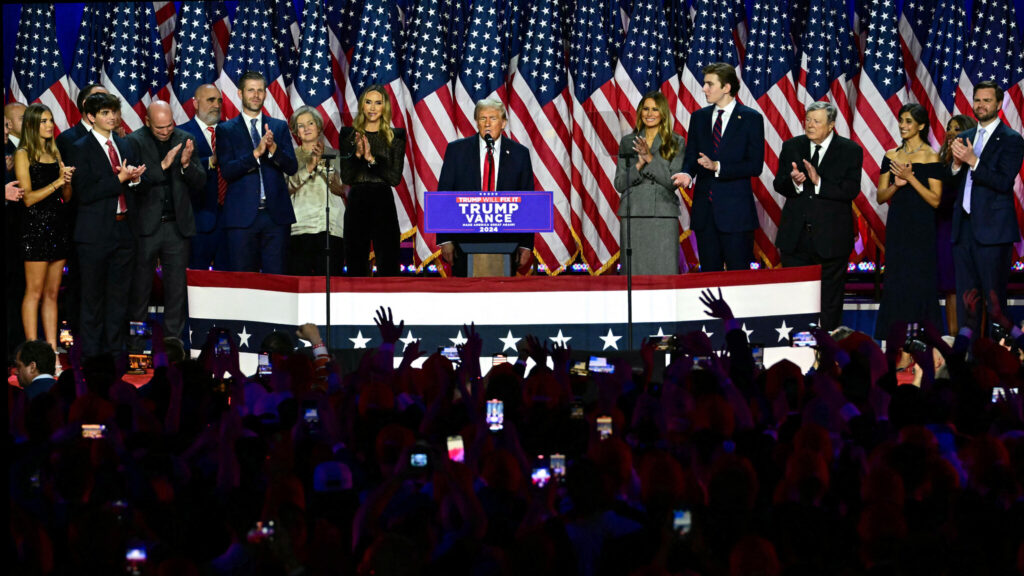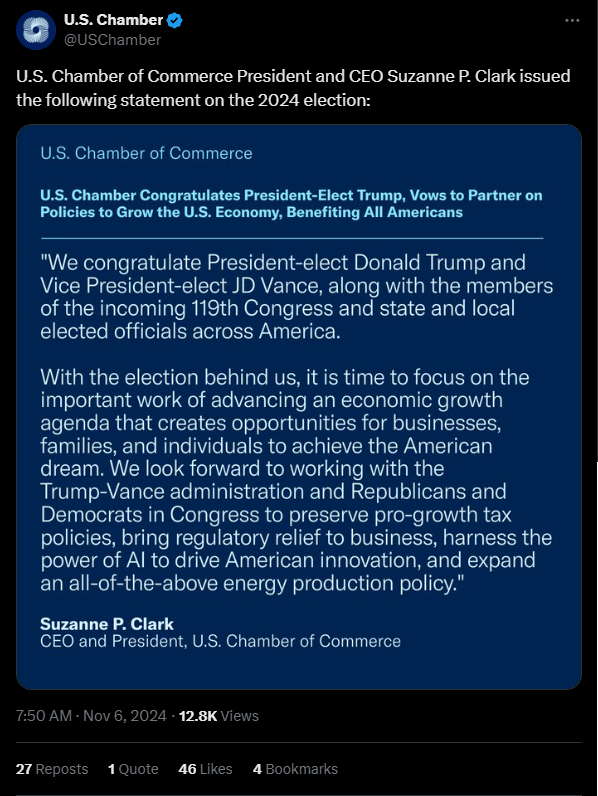Former President Readies Agenda; Republicans Win Senate Control
Freight industry leaders are welcoming President-elect Donald Trump’s return to the White House, viewing it as an opportunity to address pressing needs within the commercial transportation sector.

Groups representing trucking, construction, and the broader business community are optimistic about potential advancements under the new administration. Trump, who defeated Vice President Kamala Harris, will step back into the Oval Office in January, becoming the second president, after Grover Cleveland, to serve nonconsecutive terms.
“We congratulate President-elect Donald Trump and Vice President-elect J.D. Vance on their victory and look forward to working with their transition team and new administration in the days and months ahead,”

“President Trump made trucking a priority throughout his first term and partnered with us to enact policies that strengthened the supply chain, grew the economy, and delivered for all Americans. His second term offers an historic opportunity to build upon that record and show why the best approach to governing is one paved by common sense. That begins by replacing EPA’s electric-truck rule with national emission standards that are technologically achievable and account for the operational realities of our essential industry,” said American Trucking Associations President Chris Spear in a post-election statement.
Traffic and Route Planning: Congested roads and unexpected detours can throw a wrench in even the best-laid plans. Efficient route planning and real-time adjustments are essential to keep deliveries on track.

The upcoming legislative agenda for President-elect Trump will include significant initiatives focused on tax reform, workforce development, and civil justice system improvements. U.S. Chamber of Commerce President and CEO Suzanne Clark highlighted the importance of these issues for the nation’s economic landscape, emphasizing the need for a stable and growth-oriented environment to support American businesses.
“With the election behind us, it is time to focus on the important work of advancing an economic growth agenda that creates opportunities for businesses, families, and individuals to achieve the American dream.We look forward to working with the Trump-Vance administration and Republicans and Democrats in Congress to preserve pro-growth tax policies, bring regulatory relief to business, harness the power of AI to drive American innovation, and expand an all-of-the-above energy production policy.”
In the next four years, the Trump administration will need to steer the continued implementation of the 2021 Infrastructure Investment and Jobs Act. This legislative package is designed to modernize the nation’s highways and commercial corridors, providing a crucial update to support the demands of today’s freight and transportation industries.
During the campaign, Trump pledged to follow through on a vast policy portfolio ranging from re-evaluating emissions reduction programs to prioritizing domestic energy production. The Trump campaign also called for reversing certain Biden-era rules and regulations that respond to climate change and prioritizing traditionally powered vehicles.

“Under President Trump, the U.S. became the No. 1 producer of oil and natural gas in the world — and we will soon be again by lifting restrictions on American energy production and terminating the socialist Green New Deal. Republicans will unleash energy production from all sources, including nuclear, to immediately slash inflation and power American homes, cars and factories with reliable, abundant and affordable energy,” according to “2024 GOP Platform: Make America Great Again!,” a document endorsed by the Trump campaign. The Green New Deal is a progressive policy platform.
With Republicans set to regain the Senate majority next year, the Trump White House is poised to gain stronger support for its upcoming agenda. Among key figures, Sen. Ted Cruz (R-Texas), re-elected to represent the Lone Star State and ranking member on the Commerce Committee overseeing freight policy, is expected to play a more prominent role. Cruz’s influence in challenging policies related to electric vehicles and alternative fuels is likely to grow significantly in the next congressional session.
As a prominent leader on the committee, Cruz conducted thorough investigations into national aviation and freight rail operations, while also championing highway safety initiatives. Emphasizing the importance of this issue during a September hearing, he stated, “I agree that roadway safety is an important priority — according to the National Highway Traffic Safety Administration there were almost 41,000 motor vehicle traffic fatalities last year.”
Sen. Deb Fischer (R-Neb.), a steadfast advocate for commercial transportation policies, also secured re-election. In this congressional session, she spearheaded the bipartisan passage of the Veteran Improvement Commercial Driver License Act, a law designed to expedite the approval of specific veterans’ benefits at commercial driving schools.
As of Transport Topics’ publishing deadline, control of the U.S. House of Representatives remained undecided. A party requires a minimum of 218 members to secure a majority.
https://www.ttnews.com/articles/freight-industry-trump: Freight Industry Welcomes Trump’s White House Return